Carbon Capture and Storage (CCS) is considered as one of the main options to reduce global CO emissions. But what is CCS and how does it work? Read more from our fact sheets.
CO2 in 5 minutes
What is CO2? Why is it so important to reduce CO2 emissions? Learn all the basics of CO2 from our factsheet in 5 minutes. Read more.
CO2 capture and storage
CO2 emissions can be reduced significantly if CO2 Capture and Storage (CCS) is implemented globally. CCS is the process where CO2 is cleaned from large point sources, followed by transport of the CO2 to a safe underground storage location where CO2 is injected for long term safe storage. Read more.
CO2 capture
Capture of CO2 is the name of the process where CO2 is separated from flue gas. There are several technologies for capture, or cleaning, of CO2. Read more.
CO2 storage
Safe storage in suitable geological formation under the ground is possible. By careful characterization and selection of possible storage locations it is possible to store CO2 without leakages. Read more.
CO2 storage in the Utsira formation
CO2 has been stored underground in the Utsira formation in the North Sea for ten years without leakages. Read more.
ZEP
Bellona participates in the European Technology Platform for Zero Emission Fossil Fuel Power Plants (ZEP). This is Bellona’s main CCS project, and we regard this project as a very important tool to establish a wide deployment of CCS projects. Read more.
CDM
Bellona has suggested that CCS should be part of the Clean Development Mechanism (CDM), which is a mechanism in the Kyoto Protocol to ensure reduction in global CO2 emissions. But how does CDM works? Read more.




